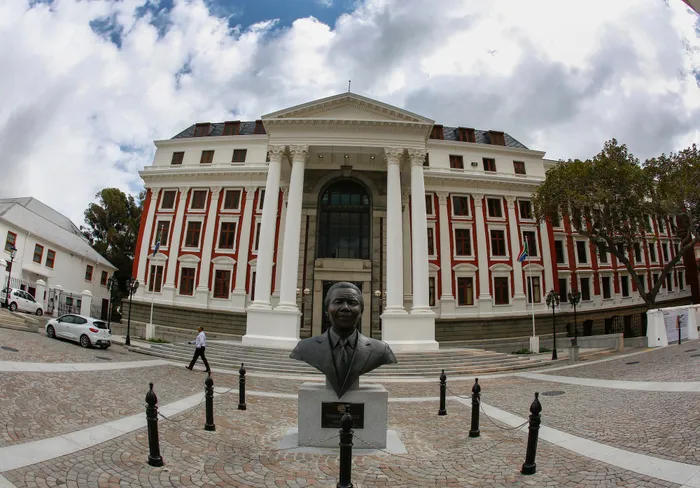National Treasury's investigation reveals ghost employees in public service

The National Treasury says it is busy verifying potential ghost workers picked up from PERSAL and data from SARS before going public on the matter.
Image: Nic Bothma / EPA
The National Treasury revealed on Wednesday that the interim result of its project of identifying ghost employees in the public service has lifted potential civil servants who may be illegally withdrawing salaries.
This emerged when the Public Service and Administration Portfolio Committee was briefed by the National Treasury, DPSA, and Auditor-General South Africa.
The National Treasury embarked on the project announced by Finance Minister Enoch Godongwana in his 2025 Budget speech after the DA put forward “a full-scale audit of ghost employees across government” as one of its conditions to vote for the budget.
Acting Chief Data Analytics Officer Ayanda Hlatshwayo told the MPs that they don’t have any final results to present, but they have made significant progress.
“On Personnel and Salary System (PERSAL), we have checks that we have put in place and that are under way, and our preliminary results are under further interrogation. These include engagements with the Department of Public Service and Administration to check we flagged people who should be flagged,” she said.
Responding to questions, Hlatshwayo stated that they could not present their interim results because “of the sensitivity of the findings”.
“We have to be sure if we are to put people’s names and accuse them of being ghosts. We are doing further checks on the names that came up from SARS, and the process in Home Affairs is under way,” she said.
“We have to verify those names so that when we present something, we are very sure about who we put on that list. I hope when we are done with the two-month verification, one will be in a position to publicly say ‘this is what we have found’ and we can say that with confidence,” Hlatshwayo said.
The project analysis data to identify potential ghosts and target areas that are potentially problematic, particularly in PERSAL data, to be cross-referenced with others from SARS, DPSA, and Home Affairs.
Data from PERSAL was being shared with the Department of Home Affairs to flag officials without a valid identification number and also use photo and biometric data to identify any instances where a photo was linked to multiple identities on PERSAL.
“These tests are limited to public servants who currently possess a smart ID or a passport, which should have a high-quality picture to allow checks to be run, but this may be insufficient for those who have the old ID book; however, there will be an attempt to use old ID book photo,” she said.
Hlatshwayo said once ghost workers are identified, they will have a two-month window period to verify themselves and provide explanations if they can.
“The objective is to verify whether these officials are actual ghost workers, or if the inconsistencies are the result of administrative errors.”
The legal teams of National Treasury and DPSA will discuss and determine that action will be taken against public servants who do not present themselves if flagged as potential ghost workers, she said.
MPs expressed outrage that the National Treasury had allowed wastage in finances by not bringing an end to the payment of ghost employees.
ANC MP Pretty Xaba-Ntshaba raised concerns that departments paid ghost employees.
“We don’t have money in South Africa, but these departments have money to pay ghosts,” Xaba-Ntshaba said.
ANC MP Phumelele Ndamase said the issue of ghost employees “is corruption personified”.
“We can't pretend that we woke up in 2025 that there are ghosts,” he said, adding that the issue had been exposed in the Eastern Cape as far back as 2012.
EFF MP Sixolise Gcilishe said the money spent on ghost employees could have been used in crucial things such as health and education.
“It is shocking that the Treasury allowed this to go on for a long time,” Gcilishe said.
Committee Chairperson Jan de Villiers said they wanted action taken against those involved in the ghost employee corruption.
“It is extremely important that all the steps taken by various departments lead up to people being investigated and jailed. That is where it should end,” De Villiers said.
He said the payments to ghost employees and irregular payments were “absolutely” the tip of the iceberg of corruption.
“Not one person creates a ghost employee and a climate for this corruption to take place,” he added.
De Villiers said the ghost employee identification should be done regularly, and it should not just be a once-off thing, but a bi-annual engagement.
“Through a simple task of identifying ghost employees, we might open and solve bigger corruption problems,” he added.
The initiative takes place as DPSA issued last month a circular to provincial and national departments, containing a framework aimed “to eliminate ghost employees and protect the integrity of human resource and payroll systems across the public service”.
Acting Deputy Director-General Anusha Naidoo said the framework required accounting officers to conduct a complete physical verification of all personnel, update records on payroll and human resources systems, and ensure that only legitimate employees receive remuneration.
“Each department must implement and maintain robust internal control mechanisms to confirm the employment status and existence of all personnel, including those appointed to the establishment and additional to the establishment,” Naidoo said.
The departments have until February 28, 2026, to conduct a physical verification of all employees and submit a report to the DPSA.
mayibongwe.maqhina@inl.co.za
Related Topics: